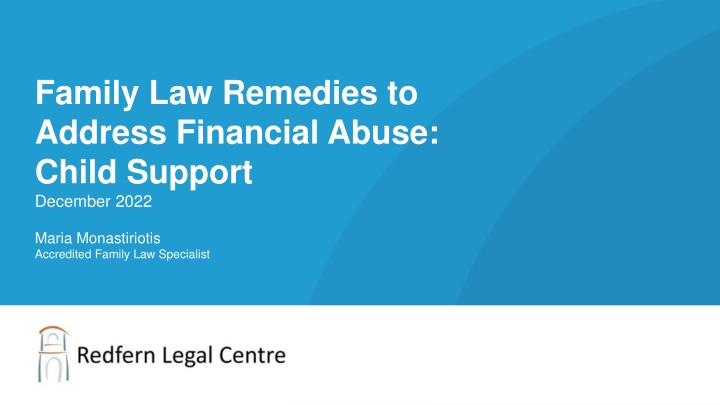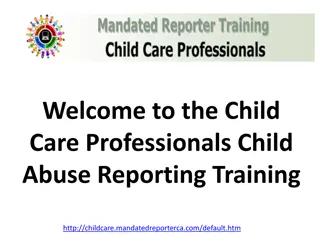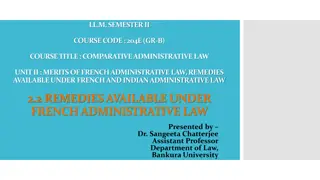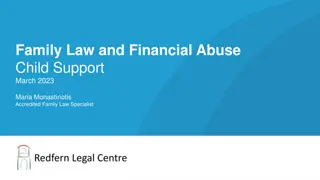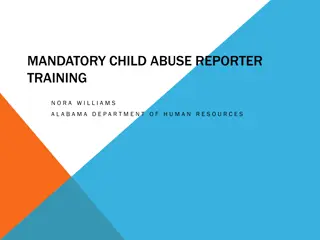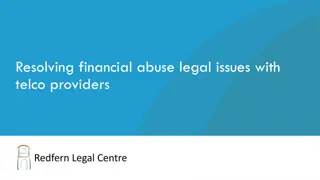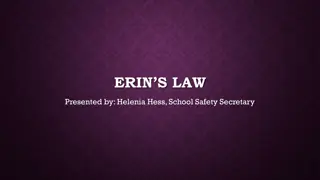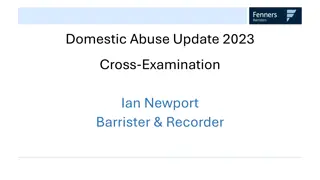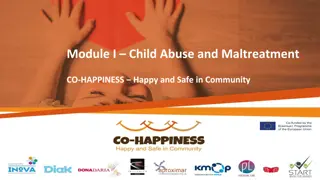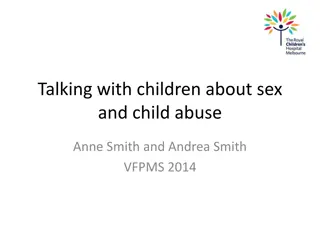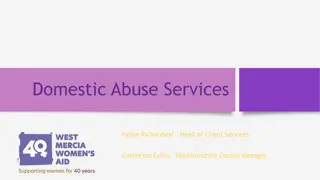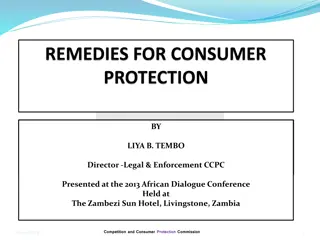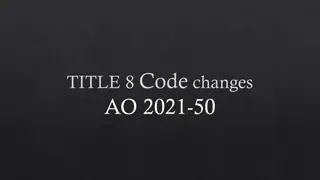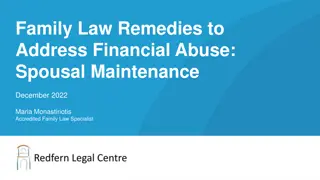Family Law Remedies for Financial Abuse in Child Support Cases
Financial abuse in the context of child support involves behaviors such as denying access to financial resources for the children, threatening custody battles based on financial strength, and manipulating income to avoid support obligations. Understanding and addressing these issues is crucial in family law proceedings to protect the well-being of children and combat financial abuse.
Download Presentation

Please find below an Image/Link to download the presentation.
The content on the website is provided AS IS for your information and personal use only. It may not be sold, licensed, or shared on other websites without obtaining consent from the author.If you encounter any issues during the download, it is possible that the publisher has removed the file from their server.
You are allowed to download the files provided on this website for personal or commercial use, subject to the condition that they are used lawfully. All files are the property of their respective owners.
The content on the website is provided AS IS for your information and personal use only. It may not be sold, licensed, or shared on other websites without obtaining consent from the author.
E N D
Presentation Transcript
Family Law Remedies to Address Financial Abuse: Child Support December 2022 Maria Monastiriotis Accredited Family Law Specialist
Acknowledgement Of Country
Outline 1. 2. 3. 4. 5. 6. 7. 8. Understanding financial abuse Financial abuse relating to children and child support Understanding child support Child support remedies Court based remedies Enforcement RLC s Financial Abuse Service NSW Questions RESOURCES: www.rlc.org.au/training/resources/financial-abuse
Understanding financial abuse
What is financial abuse? Financial or economic abuse is a form of family violence (also known as domestic violence) where an abuser uses money to gain power and to control their partner. Family violence is defined under the Family Law Act, 1975 (as amended) under section 4AB. It means violent, threatening or other behaviour by a person that coerces, a member of the person s family or causes the family member to be fearful. There is no single agreed legal definition of domestic violence in Australia.
Common behaviours Control over day-to-day household finances & material wellbeing Denying accumulation of personal assets or eroding those assets Manipulating credit and debt to the abused partner s disadvantage Blocking access to social and economic participation Financially monitoring, over-controlling and scrutinising their partner Refusing to contribute Exploiting women sexually in exchange for money SOURCE: Restoring Financial Safety: Legal Responses to Economic Abuse (see Resources)
Financial abuse relating to children and child support
Behaviour may include: Denying access to money to pay for the financial needs of the children Denying access to a motor vehicle Partner placing school fees in person s name Partner threatening custody because they are the stronger financial party Partner changing employment or using business to reduce income to avoid child support liability Partner selling or threatening to sell children s belongings, including toys, furniture, computer, iPad and other devices needed for school (the reverse is buying the affection of the children).
Behaviours (cont.) Partner refusing access to health insurance Partner cutting access to Foxtel, Netflix, internet Partner cutting off any services that benefit the children in an attempt to control person Partner placing pressure on person to contribute to mortgage even though person has left the home with the children Partner interrogating children about money or blaming person for their financial position Destroying or damaging children s property Partner failing to lodge taxation returns so lower income is used for child support assessment
Financial abuse continues after separation - creating financial and legal difficulties which impact the person and their children.
Financial abuse in First Nations communities Can occur within broader family system brothers, sisters, aunts, uncles, parents, nieces, nephews Humbugging & resource sharing can be positive (sharing and support) or negative (financial harassment and abuse, leading to increased financial stress) Additional challenges in accessing support due to language barriers, mistrust of authorities, cultural norms re discussing finances, financial literacy Gendered Violence Research Network, Understanding Economic and Financial Abuse in First Nations Communities (March 2021)
Financial abuse in CALD communities May not identify with economic abuse or financial abuse or be comfortable accessing mainstream services Some specific forms of financial abuse eg dowry-related abuse Additional challenges in accessing support due to language barriers, isolation, cultural norms (family cohesion, men as responsible for financial management), mistrust of police and courts, lack of familiarity with socioeconomic and legal systems, immigration risks, lack of financial support Gendered Violence Research Network, Understanding Economic and Financial Abuse Across Cultural Contexts (June 2021)
When will someone seek help? While they are in an abusive relationship When they are making plans to leave Immediately after they have left Many years after the relationship has ended
Understanding Child Support
Avenues to obtain child support Departure Order from the Federal Circuit and Family Court of Australia Informal arrangement Child Support Assessment Limited Child Support Agreement Binding Child Support Agreement Adult child maintenance
Child Support Assessment Both parents must be Australian residents, or one parent is a resident, and the other parent is resident of a reciprocating jurisdiction. Must be legal parent or non-parent carer Child support period starts when a person makes an application for child support and can last for up to 15 months or when notice is received from the ATO of income for the most recent financial year. Based on children s care arrangements Assessment ends when child turns 18 or completes secondary education, whichever occurs last, or if care arrangements change, if child marries or is in a de facto relationship, child no longer a resident of Australia or child dies.
Child Support remedies
Child Support remedies: Ten grounds for a change of assessment 1. The costs of raising the child are significantly affected by the high costs of spending time or communicating with the child. 2. The costs of raising the child are significantly affected because of their special needs. 3. The costs of raising the child are significantly affected because the child is being cared for, educated or trained in the way both parents intended. 4. The child support assessment is unfair because of the child's income, earning capacity, property or financial resources. 5. The child support assessment is unfair because person has transferred money, goods or property to child, the receiving parent or a third party, for the child's benefit.
Child Support remedies: Ten grounds for a change (cont.) 6. The costs of raising the child are significantly affected by the parent or nonparent carer s childcare costs, and the child is under 12 years of age. 7. Person s necessary expenses significantly reduce capacity to support the child. 8. The child support assessment is unfair because of the income, earning capacity, property or financial resources of one or both parents. 9. Person s capacity to support the child is significantly reduced because they are supporting another child or person. 10. Person s responsibility to support a resident child significantly reduces their capacity to support another child.
Court-based remedies
Review of Child Support decisions Objecting to the decision of the Child Support Registrar Court Application to the Administrative Appeals Tribunal Applications, appeals and Orders
Child Support Departure Order Grounds for a departure order have been established The court will consider the following in determining whether a departure order should be made: Step 1 It is just and equitable to make the orders Step 2 Whether it is otherwise proper to make the orders Step 3
Grounds for a Child Support Departure Order The court will only be able to make a departure order where one of the following circumstances exists: Where the Agency is unable to make a decision regarding an application for a change of assessment; or Where the parties already have matters before the court. An example would be that there are currently parenting matters being decided by the court.
Orders that can be made by a court Payment of Child Support to be paid in a form other than a periodic amount or as a lump sum Leave to seek a change of assessment for period that is more than 18 months earlier Change Child Support assessment in special circumstances Paternity Declaration Other powers of the court- declare an application frivolous or vexatious Application to set aside Child Support agreement An order to recover an amount where no Child Support liability existed Urgent maintenance orders
Limited Child Support Agreement An agreement reached between parents in relation to child support. Must have an assessment in place Amount must be equal to or greater than the assessment Must be in writing and signed by both parents (legal advice is not required but recommended). In place for three years only.
Binding Child Support Agreement Parties can enter into an agreement setting out the child support arrangements for their children. Agreement must: 1. be in writing 2. signed by both parents 3. both parents have received independent legal advice as to the terms of the agreement 4. state when the agreement ends (a terminating event). Can include: periodic amounts payment of specific items such as school fees, excursions, books, health expenses lump sum amounts.
Urgent Child Maintenance The Federal Circuit and Family Court of Australia has the power to make an urgent order for child maintenance until the child support assessment commences.
Adult Child Maintenance A parent can seek adult child maintenance for a child that is over the age of 18, and who has financial needs due to their ongoing tertiary education or some mental or physical disability. When assessing an application for a child maintenance order, the court considers: 1. the age of the child; 2. any special needs of the child; 3. the income, financial earning capacity, property and financial resources of the child; and 4. how the child is being, and in which way the parents expected the child to be, educated or trained. NB: A child can also make the application on their own behalf.
Enforcement Enforcement of lodgments of taxation returns and obtaining tax refunds Garnishing wages Travel bans
Bankruptcy Bankruptcy does not impact a person s obligation to meet their child support obligations.
Other avenues INTERIM PROPERTY ORDER SPOUSAL MAINTENANCE ARE DISCUSSED IN DETAIL IN OUR OTHER FINANCIAL ABUSE AND FAMILY LAW SEMINARS
Questions and further resources Maria Monastiriotis Accredited Family Law Specialist Financial Abuse Service NSW Redfern Legal Centre RESOURCES: www.rlc.org.au/training/resources/financial-abuse
Redfern Legal Centre Credit, Debt & Consumer Law Inner Sydney Tenants Advice & Advocacy Service Employment Law Police & Government Complaints International Student Legal Service NSW Health Justice Partnership Financial Abuse Service NSW
Structure 1. State-wide legal assistance Policy, Law Reform & Capacity Building 2. Training & resources Legal Service for community workers 3. Systemic change through policy & law reform
How we assist Free, confidential legal advice (via telephone, Zoom, face-to-face) Co-advice appointments with experts in family law & credit / debt / consumer law Representation in eligible cases Available to all people in NSW who have experienced financial abuse in an intimate partner relationship Lawyers are trauma informed, understand safety risks and the complexities of abusive relationships Non-legal needs and social support referrals
Fact Sheets Property Settlement Spousal Maintenance Child Support 10 steps to follow when separating The court process Children & parenting What is family violence?
How to contact us 1. Website, including online form: https://rlc.org.au/fas 2. Call us on 0481 730 344 3. Email us: falsintake@rlc.org.au
When we cant assist Elder abuse or financial abuse outside of intimate partner relationships refer to the National Debt Helpline https://ndh.org.au/ 1800 007 007 orthe Seniors Rights Service https://seniorsrightsservice.org.au Credit, debt and consumer law problems that are not connected to the client s experience of financial abuse refer to local community legal centre or Legal Aid. Family law issues where there are no interconnected credit and debt issues refer to local community legal centre or Legal Aid.
Learn more about RLCs work Sign up for our eBulletin www.rlc.org.au Follow us Facebook (@redfernlegal) Twitter (@RLC_CEO) Instagram (@teamRLC)
Before You Go Your feedback helps us improve our training. Please stay with us for another 30 seconds Training: rlc.org.au/what-we-do/training Enquiries: Nick Manning education@rlc.org.au This webinar is a guide to the law in Australia. It is not a substitute for legal advice. If you have a legal problem, seek legal advice from a legal centre or Legal Aid.
